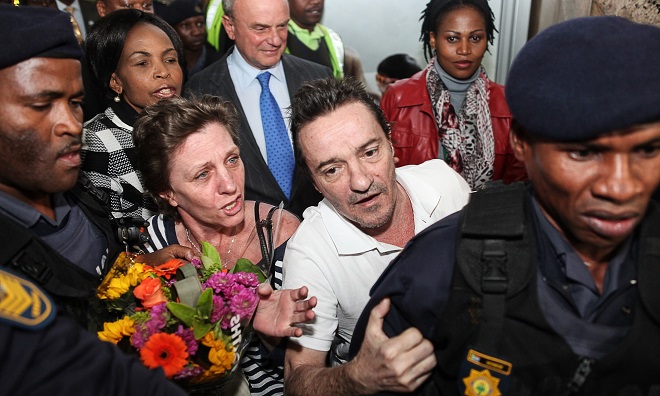
Friday October 9, 2015
Leaked document shows Italy made up story about 2012 rescue of Bruno Pelizzari and Debbie Calitz to hide ransom payment

Debbie Calitz and Bruno Pelizzari, centre, in Johannesburg in June 2012. They agreed to say their release was the result of a rescue operation by Somali security forces.
Italy’s intelligence service helped concoct a false story about a rescue of hostages by security forces to hide a ransom payment, according to a leaked spy agency document.The payment was made for the release of Bruno Pelizzari, an Italian, and South African Debbie Calitz, who were taken by Somali pirates in 2010 and released in 2012.The document marked “secret” says the Italian intelligence agency AISE paid a ransom of $525,000 (£346,000). “To conceal the payment of the ransom, AISE, SNSA (Somalia’s national security agency) and the hostages agreed to inform the media and public that the release of the hostages was the result of a successful rescue operation by the Somali security forces.”
The document highlights the contradictions in the international response to kidnapping. Both the US and UK governments refuse to pay ransoms, but other European countries have a more ambiguous approach, routinely making payments while publicly denying it.
The Italian government response to the case of Pelizzari and Calitz reflects the confusion and obfuscation. Instead of acknowledging that a ransom had been paid or simply refusing to comment, it deliberately sought to mislead.
David Cameron at a Nato summit last year reminded members, who include Italy, of their commitment not to pay ransoms.
The document revealing the Italian subterfuge is part of the spy cables cache obtained by the al-Jazeera investigative unit and shared with the Guardian. Some of the cache, which includes documents from intelligence agencies around the world, was published earlier this year and included disclosures about divisions in Israel over the Iranian nuclear programme and the targeting of the head of Greenpeace international.
An al-Jazeera documentary about hostage-taking, based on the spy cables, is being shown for the first time in London on Thursday evening.
The document dealing with the kidnapping of Calitz and Pelizzari, dated 6 July, is marked “secret” and was written by a South African intelligence officer responsible for the Horn of Africa.
Pelizzari and Calitz had been sailing in the Indian Ocean when they were seized by the pirates and held in unknown locations in Somalia. On their release, they were flown by private jet to Rome on 22 June 2012, where they were met by Italian officials and a representative of the South African government. The document says “... the hostages were instructed by the Italian officials not to disclose that a ransom was paid but to rather inform the media that the TFG [transitional federal government] of Somalia rescued them”.
The news agency Agence France-Presse, among others, reported at the time: “Somali authorities last Thursday said the pair were freed in an overnight joint raid by security forces and the army from ‘al-Qaida-affiliated’ insurgents, with South Africa saying Italy was also involved.”
The New York Times reported in July that al-Qaida and its affiliates had taken in at least $125m in revenue from kidnappings since 2008, of which $66m was paid just last year.
A spokesman for Italy’s foreign ministry said he could not comment on this specific case but said that Italy’s position on hostages was unchanged. He pointed to comments that have repeatedly been made in parliament in which ministers have denied that Italy pays ransom in exchange for the release of hostages.
This is not the first time questions have been raised about Italy’s adherence to that policy. The Guardian reported in January that two Italian aid workers – Greta Ramelli and Vanessa Marzullo – who were being held as hostages by Syria’s largest al-Qaida group were released following the payment of a multimillion dollar ransom to the al-Nusra Front.
The differing approach by governments is an emotive issue. A study by the New York Times showed that of 23 foreigners held in Syria by Islamic State, a majority were freed after payments were made, but those from the US and the UK were killed or are still being held.
Barack Obama partially relaxed White House policy in June, holding to the line that the US government will not pay ransoms but making it clear that families that wanted to do so would not face prosecution. The move was criticised by Mark Mitchell, who until January 2015 was the US president’s director of counter-terrorism at the White House.